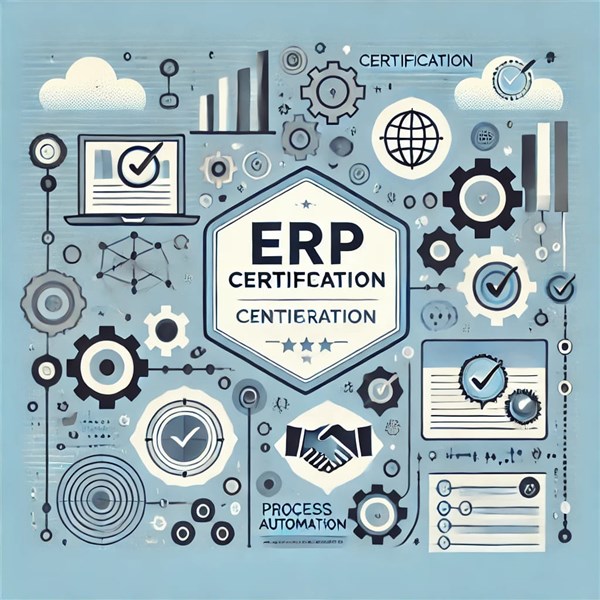
In today's rapidly evolving business landscape, organizations are increasingly relying on Enterprise Resource Planning (ERP) systems to streamline operations, enhance productivity, and drive growth. As a result, the demand for IT professionals with ERP expertise is on the rise. Obtaining an ERP certification can provide a significant edge in this competitive job market. In this blog, we will explore the numerous benefits of ERP certification for IT professionals, including enhanced career opportunities, skill development, improved job performance, and increased earning potential.
Understanding ERP Certification
Before diving into the benefits, it’s essential to understand what ERP certification entails. ERP certification programs are designed to equip IT professionals with the knowledge and skills necessary to implement, manage, and optimize ERP systems. These certifications typically cover various aspects of ERP software, including system configuration, data management, business processes, and project management.
Some of the most recognized ERP certifications include:
- SAP Certified Application Associate
- Oracle Certified Professional (OCP)
- Microsoft Certified: Dynamics 365 Fundamentals
- Infor Certified Professional
- NetSuite ERP Consultant Certification
Benefits of ERP Courses
Each certification has its unique focus, catering to different ERP systems and business needs.
1. Enhanced Career Opportunities
One of the most significant benefits of obtaining an ERP certification is the expanded career opportunities it provides. Organizations are increasingly seeking candidates with specialized skills in ERP systems. By earning a certification, IT professionals can position themselves as valuable assets to potential employers, opening doors to various roles, including:
- ERP Consultant
- ERP Project Manager
- ERP System Analyst
- Business Process Analyst
- IT Manager
As businesses invest in ERP implementations and upgrades, the demand for skilled professionals in this area continues to grow. Certified IT professionals are often favored for these roles, as they demonstrate a commitment to continuous learning and possess the requisite knowledge to succeed.
2. Skill Development
ERP certification programs require candidates to acquire a comprehensive understanding of ERP systems and their functionality. This process helps IT professionals develop critical skills, including:
a. Technical Skills
- System Configuration: Understanding how to configure ERP systems to meet specific organizational needs.
- Database Management: Gaining knowledge of data storage, retrieval, and management within ERP systems.
- Reporting and Analytics: Learning to generate reports and analyze data for informed decision-making.
b. Business Process Knowledge
- Business Process Mapping: Understanding how to map and optimize business processes using ERP systems.
- Change Management: Learning to manage change effectively within an organization during ERP implementation.
c. Project Management Skills
- Planning and Execution: Gaining insights into project planning, execution, and monitoring in ERP implementations.
- Stakeholder Management: Learning how to communicate and collaborate effectively with various stakeholders.
These skills are not only applicable to ERP systems but also enhance an IT professional's overall capabilities in project management, system analysis, and business operations.
3. Improved Job Performance
Earning an ERP certification can lead to improved job performance in various ways:
a. Increased Productivity
With a deeper understanding of ERP systems, certified professionals can leverage the software’s full potential to enhance productivity. They can streamline processes, automate repetitive tasks, and facilitate better collaboration across departments.
b. Effective Problem-Solving
Certified IT professionals are better equipped to identify and resolve issues within ERP systems. Their comprehensive knowledge enables them to troubleshoot effectively and implement solutions that minimize downtime and disruptions.
c. Enhanced Collaboration
As ERP systems integrate various business functions, certified professionals can facilitate better collaboration between departments. Their expertise allows them to serve as a bridge between IT and business teams, ensuring that everyone is aligned and working toward common goals.
4. Increased Earning Potential
Another compelling benefit of obtaining an ERP certification is the potential for increased earning power. According to various industry studies, professionals with ERP certifications often command higher salaries than their non-certified counterparts. For instance:
- ERP Consultants: With certification, they can earn salaries ranging from $80,000 to over $130,000 annually, depending on experience and specialization.
- ERP Project Managers: They often earn salaries upwards of $100,000, especially if they hold certifications in specific ERP platforms.
While salary figures can vary based on factors like location, industry, and level of experience, the general trend indicates that certification leads to better financial rewards.
5. Networking Opportunities
Obtaining an ERP certification also opens doors to valuable networking opportunities. Many certification programs offer access to exclusive forums, events, and online communities where professionals can connect, share knowledge, and collaborate on projects. Networking with fellow certified professionals can lead to:
- Job Referrals: Many job opportunities arise through professional connections.
- Mentorship: Networking can lead to mentorship opportunities, where experienced professionals can guide newcomers in their careers.
- Collaboration: Certified professionals can collaborate on projects, enhancing their skills and experience.
6. Industry Recognition and Credibility
Earning an ERP certification enhances an IT professional's credibility within the industry. Certifications are recognized by employers and peers as a validation of expertise and commitment to professional development. This recognition can significantly boost a professional's reputation and increase their chances of being selected for high-stakes projects or leadership roles.
7. Adaptability to Technological Changes
The field of ERP is constantly evolving, with new features, tools, and technologies emerging regularly. ERP certification programs typically cover the latest trends and advancements in the industry, ensuring that certified professionals remain up-to-date. This adaptability is crucial in a technology-driven world, as it enables professionals to respond effectively to changes and leverage new opportunities.
Conclusion
In summary, obtaining an ERP certification offers numerous benefits for IT professionals, including enhanced career opportunities, skill development, improved job performance, increased earning potential, valuable networking opportunities, industry recognition, and adaptability to technological changes. As businesses continue to embrace ERP systems to drive efficiency and growth, the demand for certified professionals will only increase. For IT professionals looking to advance their careers and become leaders in their organizations, pursuing an ERP certification is a strategic investment in their future.
By taking the steps to earn an ERP certification, professionals position themselves as indispensable assets in the ever-evolving business landscape, paving the way for a successful and fulfilling career in the world of ERP and beyond.
Data and analytics courses are a must for anyone looking to master big data. They cover a wide range of topics, from basic intro to data analysis to advanced statistical techniques. Koenig Solutions offers an array of data and analytics courses that are industry-relevant and designed to meet the ever-changing demands of the business world.
In conclusion, big data certification plays a pivotal role in data-driven decision making. It equips professionals with the tools and techniques necessary to make sense of complex data sets and derive actionable insights. Koenig Solutions, a leading IT training company, provides certifications in top technology courses, including big data and analytics.


.jpgM.jpg)
.jpgM.jpg)



COMMENT